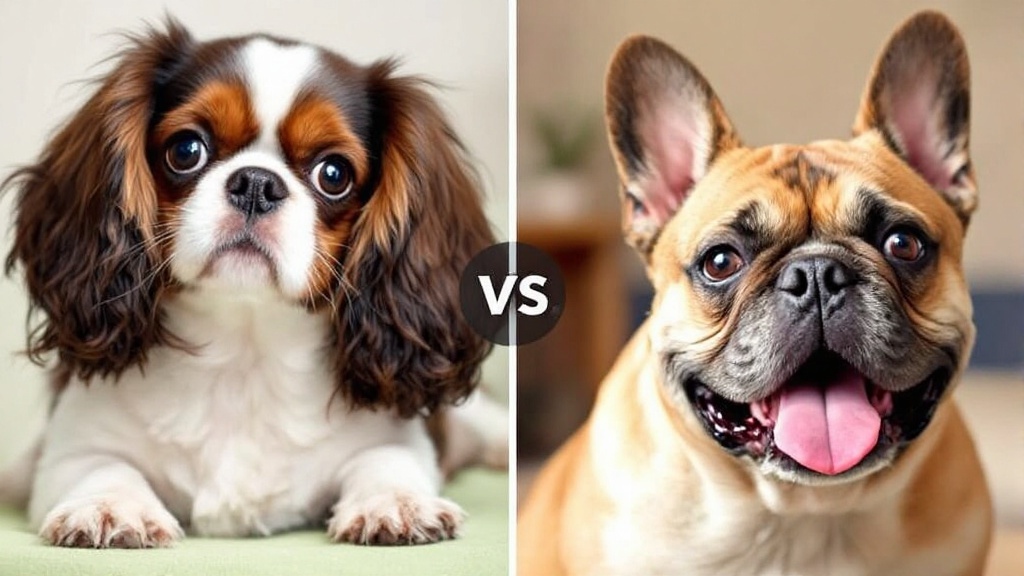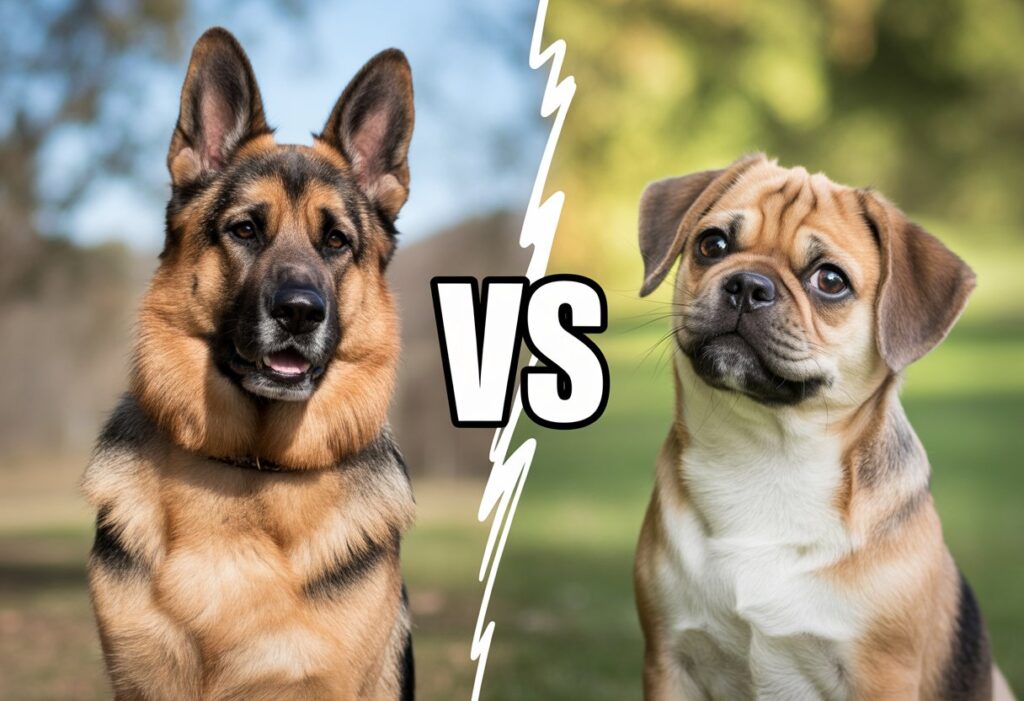Choosing between a Cavalier King Charles Spaniel and a French Bulldog really comes down to what you want in a pet. Both breeds have their own quirks, energy levels, and care needs, so the best fit will depend on your lifestyle and home.
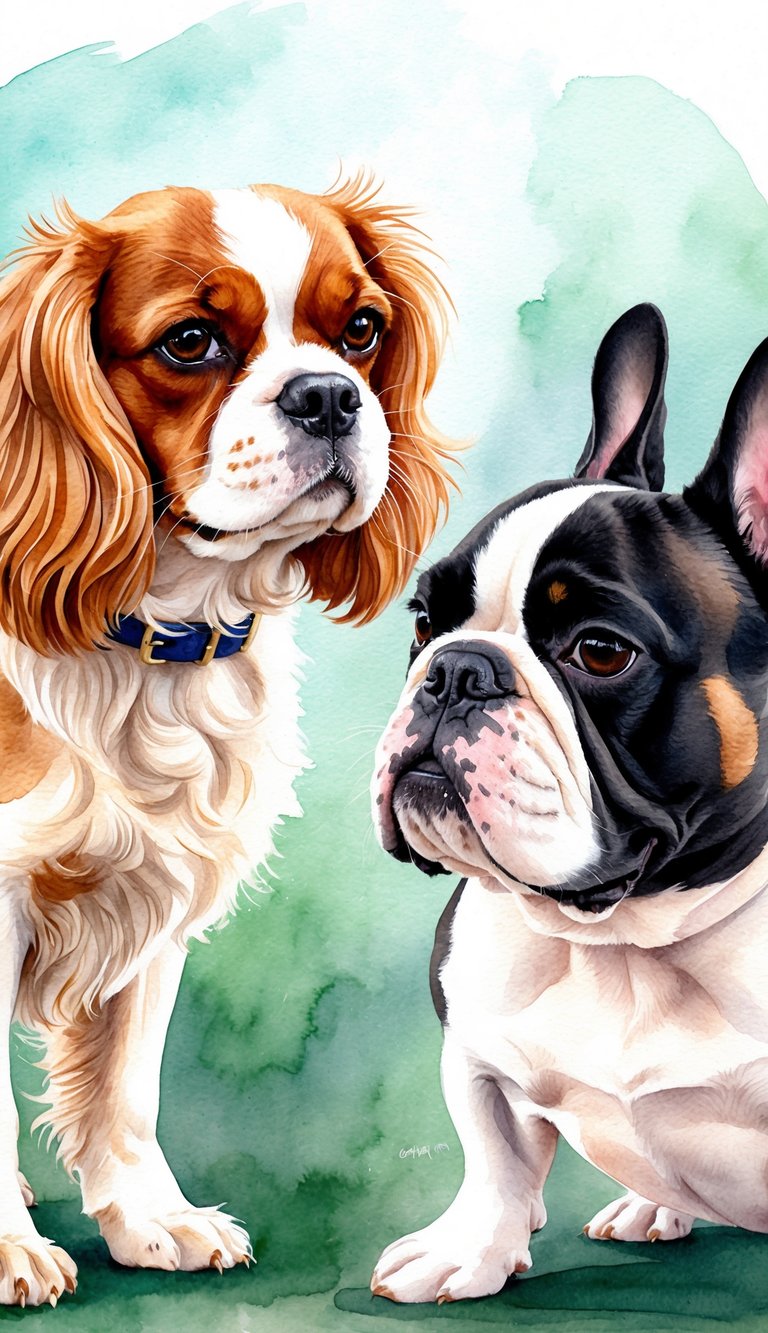
Cavaliers tend to be gentle, friendly, and make wonderful companions. French Bulldogs are more laid-back, need less exercise, but might have more health issues.
Let’s see how these two popular breeds stack up in appearance, activity, and care.
Key Takeaways
- Each breed matches up with different energy levels and daily routines.
- Grooming and health care aren’t the same for both.
- Their personalities and space needs really impact how well they’ll fit into your home.
Breed Origins and History
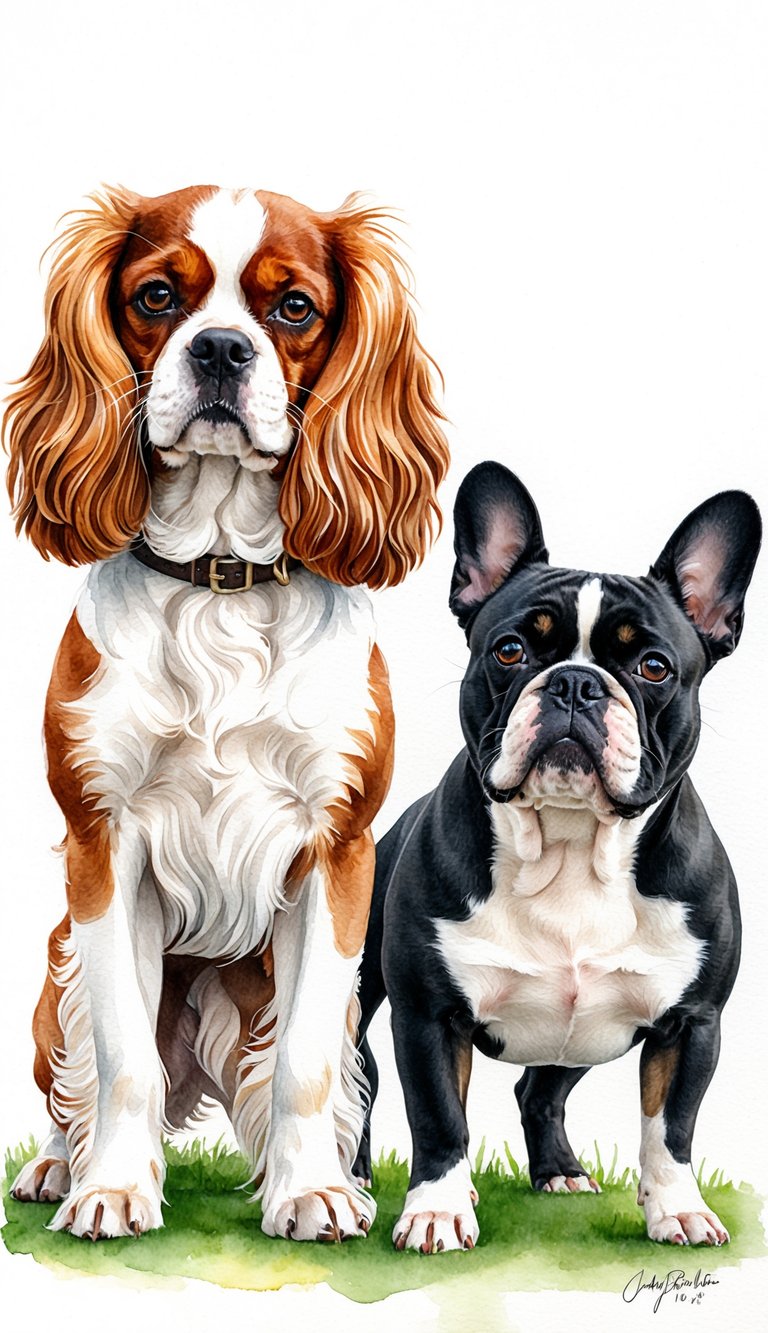
Let’s dig into where these dogs came from. Their backgrounds shaped both their looks and personalities.
These histories involve a lot of selective breeding and some interesting roles in society.
Cavalier King Charles Spaniel Heritage
The Cavalier King Charles Spaniel started out in the United Kingdom. King Charles II adored these little spaniels back in the 17th century, so they became favorites among royalty.
The breed almost disappeared in the early 1900s. Breeders stepped in, crossing small spaniels with toy breeds to revive the look.
The American Kennel Club (AKC) recognized Cavaliers in 1995. They’re now known for being friendly and looking rather elegant.
French Bulldog Development
French Bulldogs, or “Frenchies,” popped up in France in the 1800s. Their roots go back to small bulldogs from England, where breeders aimed for a companion dog with a compact frame and those signature bat ears.
They caught on with lace workers in Paris. Over time, careful breeding shaped their look and mellow vibe.
The AKC recognized French Bulldogs in 1898. These days, people love them for their playful, easy-going nature.
Notable Ancestors in Dog Breeding
Both breeds owe a lot to their ancestors. Cavaliers come from toy spaniels you’ll spot in old European paintings.
Bulldogs influenced both breeds’ histories. The original Bulldog was bred for bull-baiting but eventually became a gentle house dog.
Breeders focused on temperament and size, especially for the modern French Bulldog. These breeds often get the spotlight at Westminster Kennel Club shows, which says something about their status.
Physical Appearance
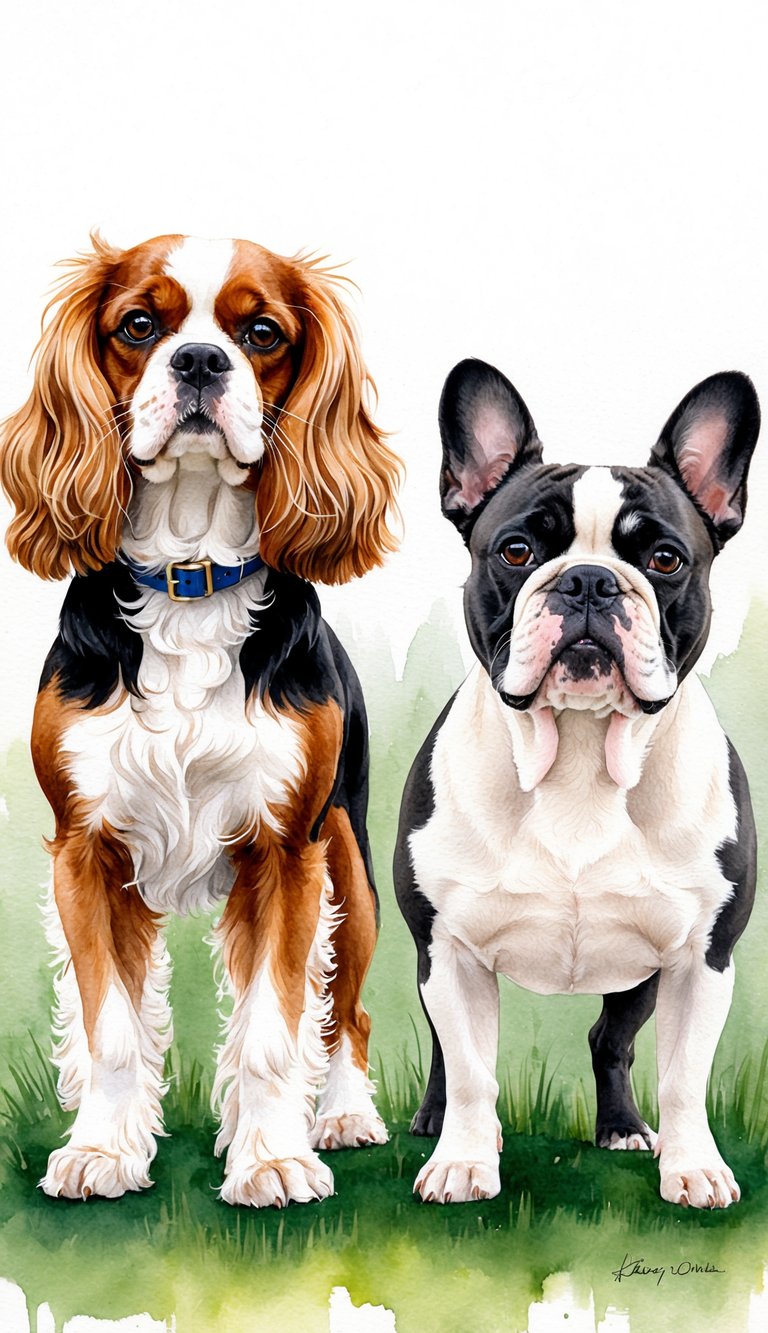
You’ll notice big differences in size and shape between these two. Their head shapes, coats, and colors are pretty distinct as well.
Some traits—like a flat face—change not just how they look, but how you’ll need to care for them.
Size and Weight Differences
Cavalier King Charles Spaniels are usually a bit taller, standing 12 to 13 inches at the shoulder. They weigh in at 13 to 18 pounds.
French Bulldogs are shorter, around 11 to 12 inches, but stockier. They can weigh anywhere from 16 to 28 pounds.
Cavaliers look more slender, while Frenchies are all muscle and bulk. The Bulldog’s body is definitely more compact.
Distinctive Features
Cavaliers have long snouts and gentle, tapering faces. Their ears are long and full of feathery hair. Their eyes are big, round, and dark.
French Bulldogs have a short, broad muzzle and those upright “bat ears.” Their eyes are round but set wider apart, and their flat face gives them a pretty unique look.
The Spaniel’s appearance is more elegant, while the Bulldog’s face just screams sturdy and bold.
Coat Type and Colors
Cavaliers sport a medium-length, silky coat that lies flat with a bit of wave. Colors include Blenheim (chestnut and white), Tricolor, Ruby (solid red), and Black & Tan.
French Bulldogs have a short, smooth coat that’s much easier to care for. Their colors range from brindle, fawn, white, and cream to pied (white with another color).
If you want a dog with low-maintenance fur, Frenchies are easier. If you like a luxurious coat, Cavaliers win out.
Flat-Faced Traits
French Bulldogs are brachycephalic, meaning they’ve got a flat face and short nose. This can make breathing harder, especially in heat.
Cavaliers have a medium-length muzzle, so breathing issues are less of a concern.
If you’d rather avoid flat-faced health worries, Cavaliers are probably the safer bet.
Breed Characteristics
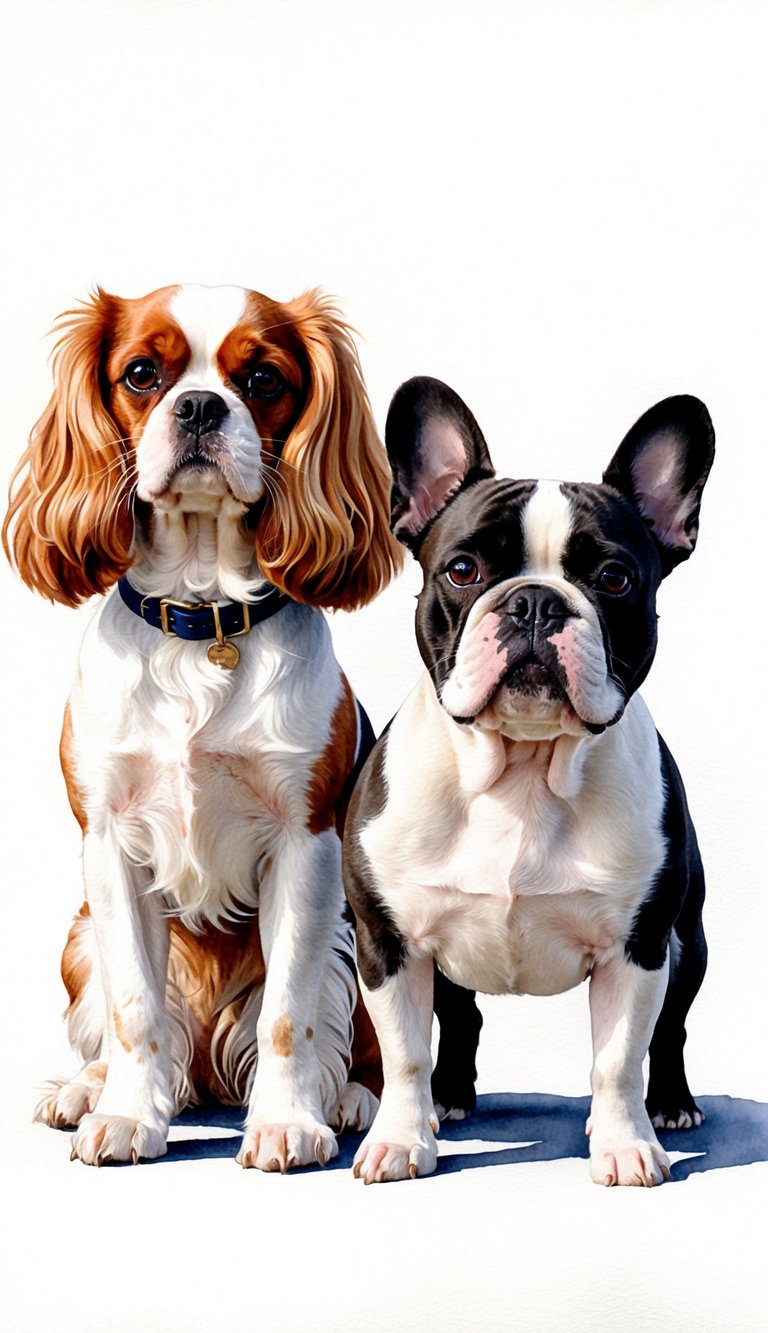
Both breeds were made to be companions, but their personalities and quirks are pretty different. Think about their behavior, how they get along with people, and how easy they are to train.
Temperament and Personality
Cavalier King Charles Spaniels are gentle and affectionate. They love to please and are friendly with kids and strangers.
They enjoy cuddling and stay pretty calm indoors. Regular social time keeps them happy.
French Bulldogs are playful but a bit stubborn. They form tight bonds with their families and can be more protective.
Frenchies like to relax and are great for apartments. The Cavalier is usually more openly social, while the Frenchie shows a bit more independence.
Intelligence and Trainability
Cavaliers pick up new things quickly and respond well to positive training methods. They love praise and a steady routine.
French Bulldogs are smart but can be stubborn. Training works best if you keep it short and fun.
Both breeds do better with early socialization. Cavaliers might be easier for first-time dog owners, while Frenchies need a bit more patience but reward you with loyalty.
Exercise and Activity Needs
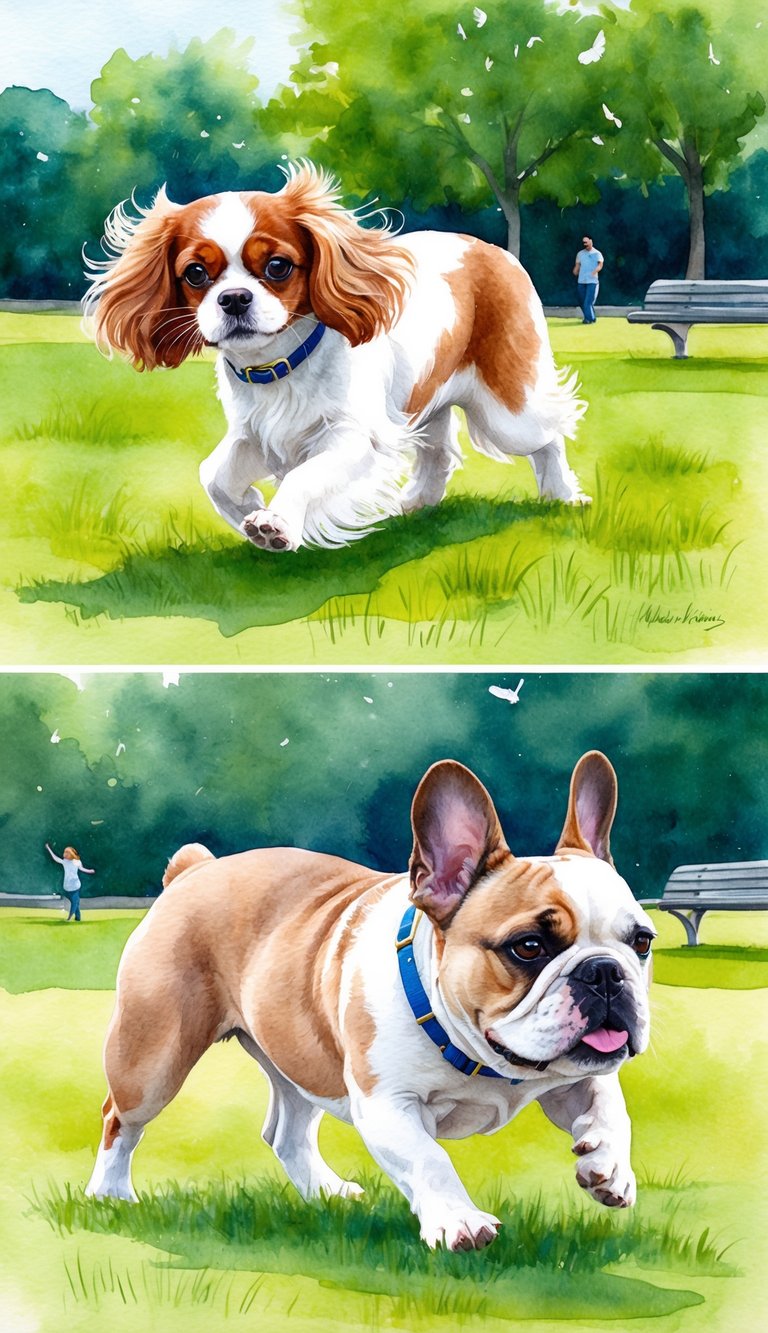
Both breeds need regular activity to stay healthy. Their energy levels and exercise needs are not the same, though.
Daily Exercise Requirements
A Cavalier King Charles Spaniel needs about 30 to 60 minutes of exercise every day. Walks, playtime, or training sessions all work.
Don’t push them too hard—they’re not marathon runners.
French Bulldogs need less, around 20 to 30 minutes daily. Their short noses make heavy exercise tough, especially in heat.
Short, gentle walks are perfect for them.
Suitable Activities
Cavaliers love daily walks and games like fetch. They also enjoy agility and mental challenges.
French Bulldogs are happy with slow walks and short play sessions. Skip activities that make them overheat or breathe hard.
Energy Levels
Cavaliers have a moderate energy level. They love to play but are just as happy to chill with you.
French Bulldogs have lower energy. They’re all about short bursts of activity and long naps.
Don’t expect them to keep up with high-energy dogs or long hikes.
Grooming and Maintenance
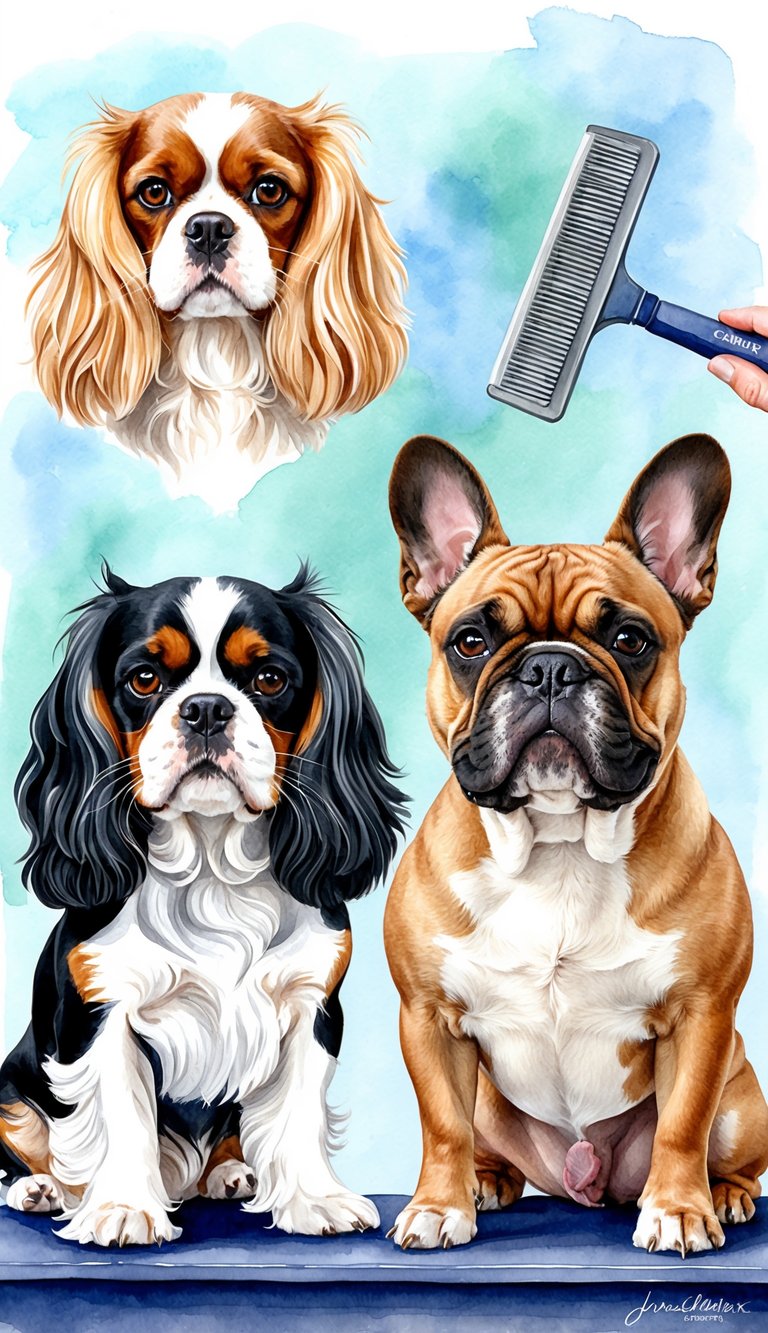
The Cavalier King Charles Spaniel and French Bulldog have different grooming needs. Coat care, shedding, and basic health routines all matter.
Coat Care
Cavaliers have long, silky coats, a bit like English Cocker Spaniels or Shih Tzus. You’ll need to brush them 3-4 times a week to prevent mats and tangles.
A slicker brush and a comb do the trick.
French Bulldogs have short, smooth coats that are much simpler to manage. Weekly brushing with a soft bristle brush keeps their fur in good shape.
Frenchies don’t need professional grooming much at all.
Both breeds benefit from regular baths, but don’t overdo it—natural oils are important. When you groom, check ears, especially for Cavaliers, since floppy ears can trap moisture.
Shedding and Allergies
Cavaliers shed year-round, and it gets heavier seasonally. You’ll probably find hair on your clothes and furniture.
If you have allergies, Cavaliers can be a challenge due to more dander and shedding.
French Bulldogs shed less, but it still happens. Their shedding is lighter and more random.
They might be a better pick for some allergy sufferers, but no dog is truly hypoallergenic.
Regular brushing and the occasional deshedding tool help a lot. Clean and groom your dog often for a tidier home.
Routine Health Maintenance
Both breeds need their nails trimmed every 3-4 weeks. Paw care matters, especially for Frenchies, since their skin folds can trap dirt.
Dental care is huge. Brush their teeth daily or at least weekly with dog-safe toothpaste to prevent plaque and bad breath.
Regular ear checks and cleanings help prevent infections. Cavaliers need extra ear care because of their floppy ears.
Vaccinations, flea control, and routine vet visits are musts for both breeds.
Health and Lifespan
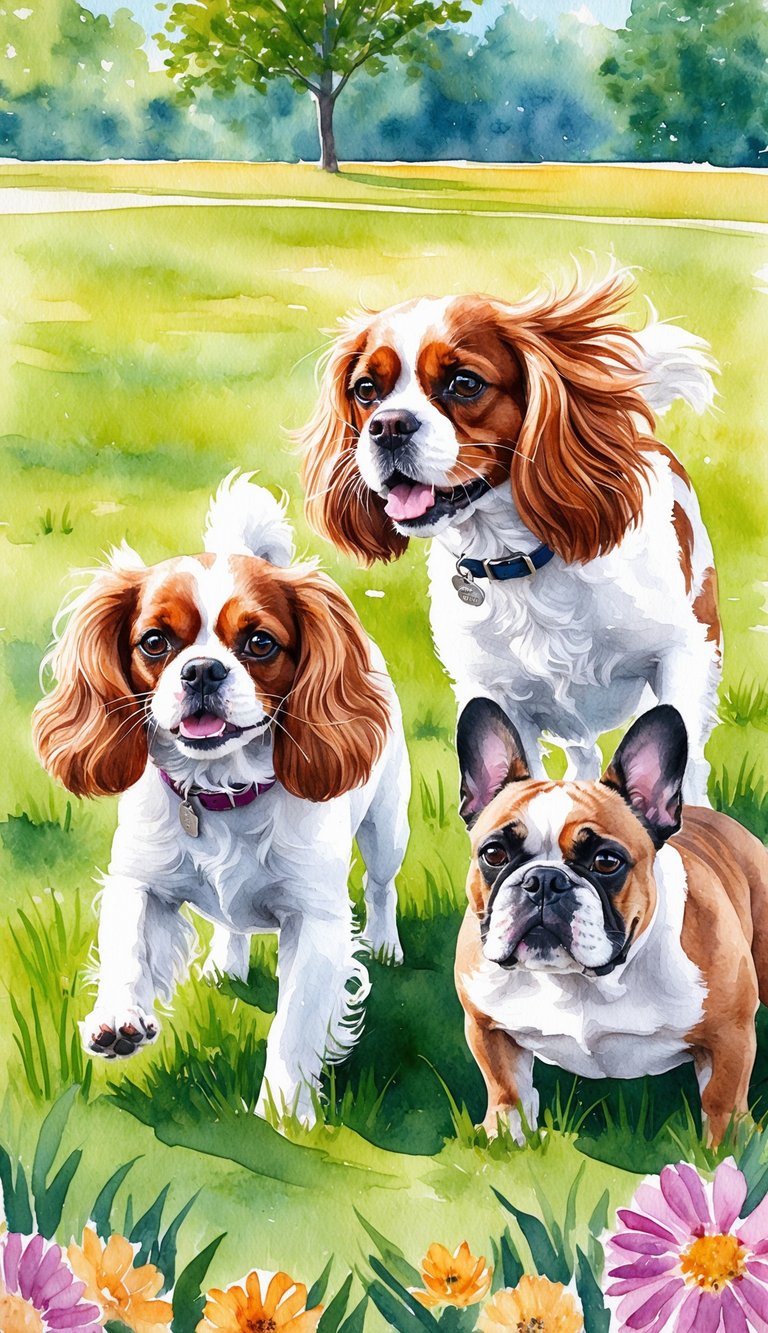
Both the Cavalier King Charles Spaniel and French Bulldog have some health challenges you should know about. Their life expectancy varies, and each one needs special care to stay healthy.
Common Health Issues
Cavalier King Charles Spaniels often face heart problems, especially mitral valve disease. They also have risks for syringomyelia, a painful condition that affects the brain and spine.
Eye problems like cataracts and ear infections show up pretty often in Cavaliers. French Bulldogs, on the other hand, usually struggle with breathing because of their flat faces (brachycephalic).
They can deal with hip dysplasia, spine issues, and skin allergies. Their eyes are also prone to things like cherry eye and dry eye.
Early detection and regular vet visits make a difference for both breeds. If you keep an eye out, you can manage or even prevent some serious problems.
Longevity and Life Expectancy
Cavalier King Charles Spaniels usually live around 10 to 14 years. Their lifespan depends a lot on heart health and early care for neurological issues.
Keeping them active and managing their weight can help them live longer. French Bulldogs have a shorter average lifespan, typically about 10 to 12 years.
Their breathing problems can really threaten their health and knock years off if not managed carefully. Obesity and heat intolerance also play a role in how long they stick around.
You’ll want to think about your ability to meet the health needs of each breed before making a choice.
Veterinary Care Considerations
Both breeds need regular check-ups to catch illnesses early. Cavaliers benefit from heart exams and neurological screenings.
You might need to schedule extra tests to spot problems before they become serious. French Bulldogs need breathing assessments and joint checks.
Because of their anatomy, anesthesia can be riskier for Frenchies, so vets tend to take extra precautions during surgery. It’s not a bad idea to talk with your vet about breed-specific care so you can plan preventive treatments.
Vaccinations, diet, and exercise should fit each dog’s needs to lower health risks.
Adaptability and Living Environment
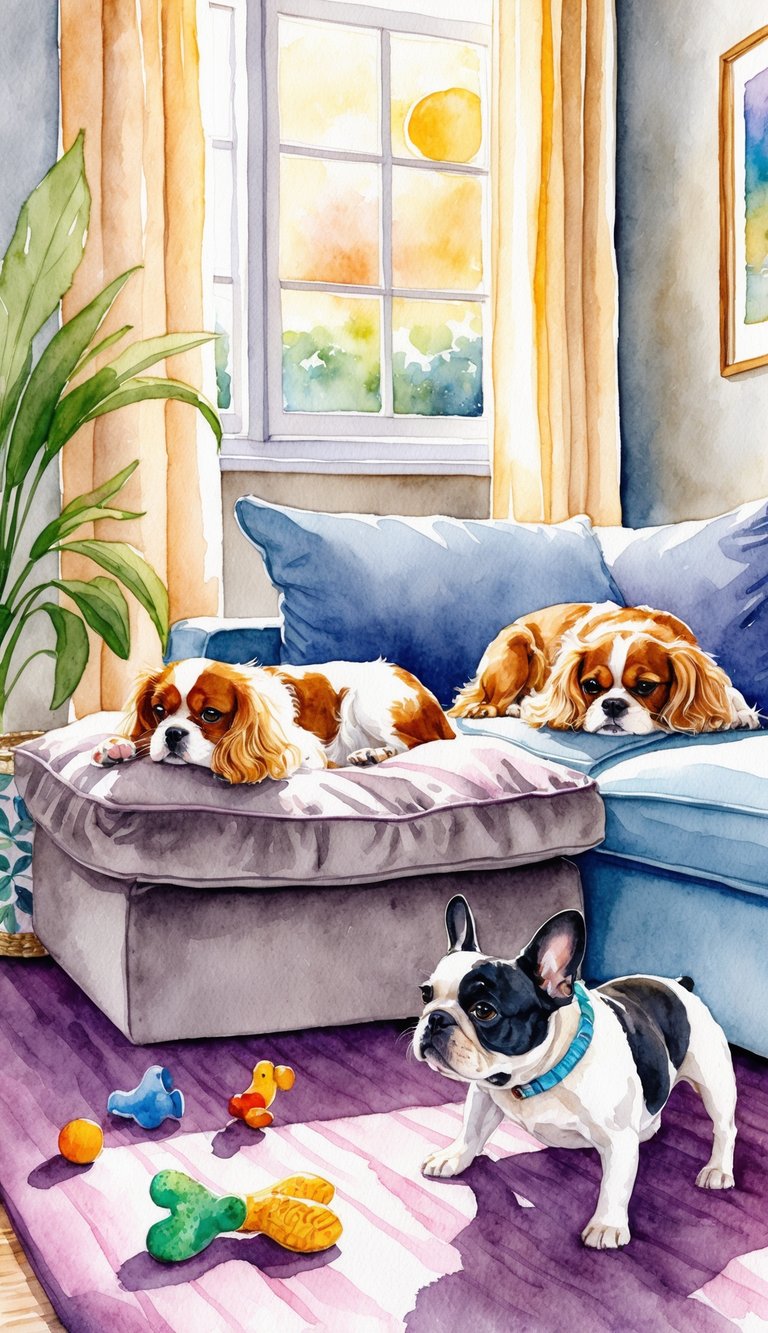
Both breeds fit well in small spaces, but they have different exercise and comfort needs. Their tolerance for weather and other pets can affect daily care and where they’re happiest.
Apartment and Urban Living
The French Bulldog thrives in apartments thanks to its small size and low energy. It doesn’t need much outdoor space and usually prefers short walks.
You’ll want to offer mental stimulation, though, since boredom can set in quickly. The Cavalier King Charles Spaniel can also do fine in apartments but needs more exercise.
Daily walks and playtime keep Cavaliers happy. They love being active, so access to a small yard or nearby park is a bonus.
Climate Tolerance
French Bulldogs do better in cooler climates since their flat faces make hot weather tough for them. Long outdoor activities in heat or humidity can be risky.
They handle cold weather a bit better, but you still need to watch for shivering. Cavaliers are more adaptable to temperature changes.
Their medium-length coat gives some protection in the cold, though they still need shelter. You can take them on longer walks in cooler or mild weather, but limit time outside on hot days.
Compatibility With Other Pets
Both breeds usually get along with other pets if you socialize them early. French Bulldogs can be a little stubborn, but they’re generally friendly with dogs and cats.
Cavaliers are super social and love having other pets around. They rarely get aggressive and often form close bonds.
You should supervise introductions, but honestly, both breeds adapt well in multi-pet homes.
Comparison With Similar Breeds
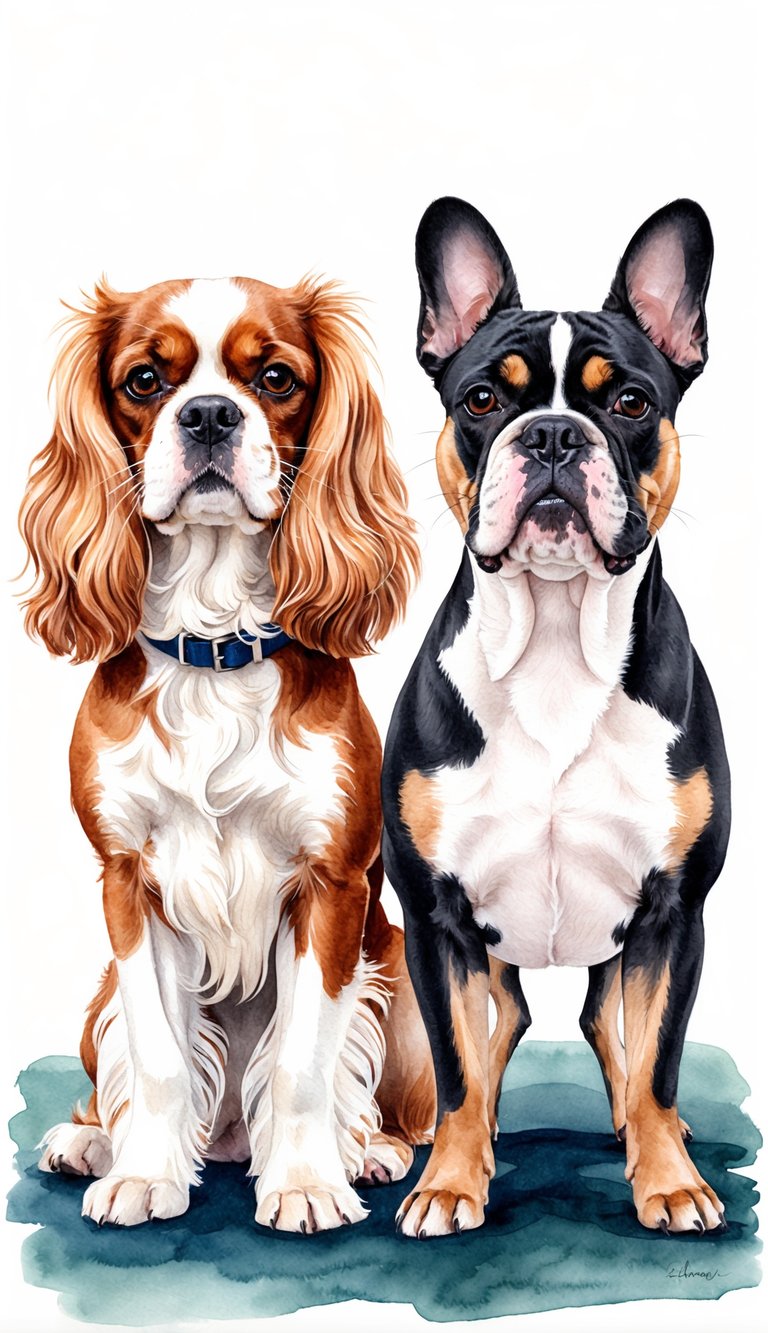
If you’re torn between a Cavalier King Charles Spaniel or French Bulldog, you might want to check out other breeds with similar sizes or personalities. Sometimes a different dog just fits your lifestyle better.
Cavalier King Charles Spaniel Alternatives
If you love the Cavalier’s friendly, gentle vibe, the Beagle is a solid choice. Beagles have more energy and need extra exercise, but they’re great with families.
Regular walks and playtime are a must for Beagles. The Pembroke Welsh Corgi shares that affectionate side but is more alert and can be protective.
Corgis need both mental and physical stimulation to stay happy. For a bigger, easygoing pal, the Golden Retriever or Labrador Retriever could work.
Both are friendly and awesome with kids, but they need daily exercise and room to run. Their energy level is a notch above the Cavalier’s.
French Bulldog Alternatives
If you’re drawn to the French Bulldog’s compact size and calm attitude, the English Bulldog is pretty similar, just stockier. Both breeds can have breathing problems and need close health monitoring.
The Pug is another small breed with a playful, loving personality like the Frenchie. Pugs need regular cleaning of their facial folds and can also have breathing issues.
If you want a bit more energy, the Boxer is a medium-sized dog that’s loyal and protective. Boxers need more exercise and training, so they’re better for active owners.
You could also look at the Dachshund for a small but lively companion. Dachshunds need activity to avoid weight gain and back problems, but they’re very devoted to their people.
Suitability for Owners
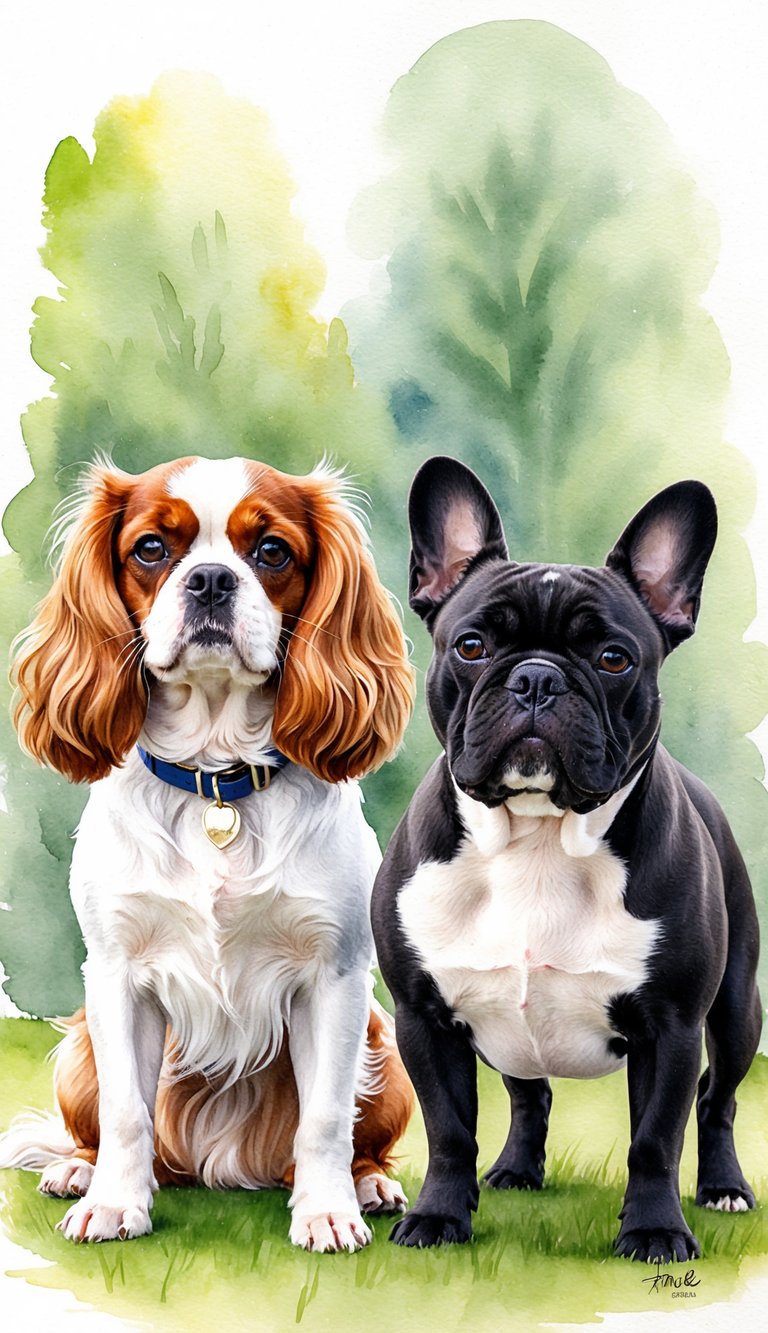
Both breeds have different needs and personalities that affect how well they’ll fit into your life. Your choice depends on your experience with dogs and what kind of family setup you’ve got.
First-Time Dog Owners
If you’re new to dogs, a Cavalier King Charles Spaniel might be easier to handle. They’re gentle, eager to please, and usually pick up training pretty well.
Cavaliers adjust easily to different living spaces, even apartments. French Bulldogs also suit first-time owners, but you’ll need to pay more attention to their health.
They can be stubborn with training, so patience helps. Their low exercise needs are great for less active owners.
Family Friendliness
Cavaliers are great with children. Their calm, affectionate nature makes them wonderful playmates.
They usually get along well with other pets at home. You’ll notice they slip right into family life without much fuss.
French Bulldogs are good with families too, though they might not love rough play. They’re protective and form strong bonds with their people.
Sometimes, Frenchies need supervision around small kids. They really thrive in homes where they get plenty of attention.

